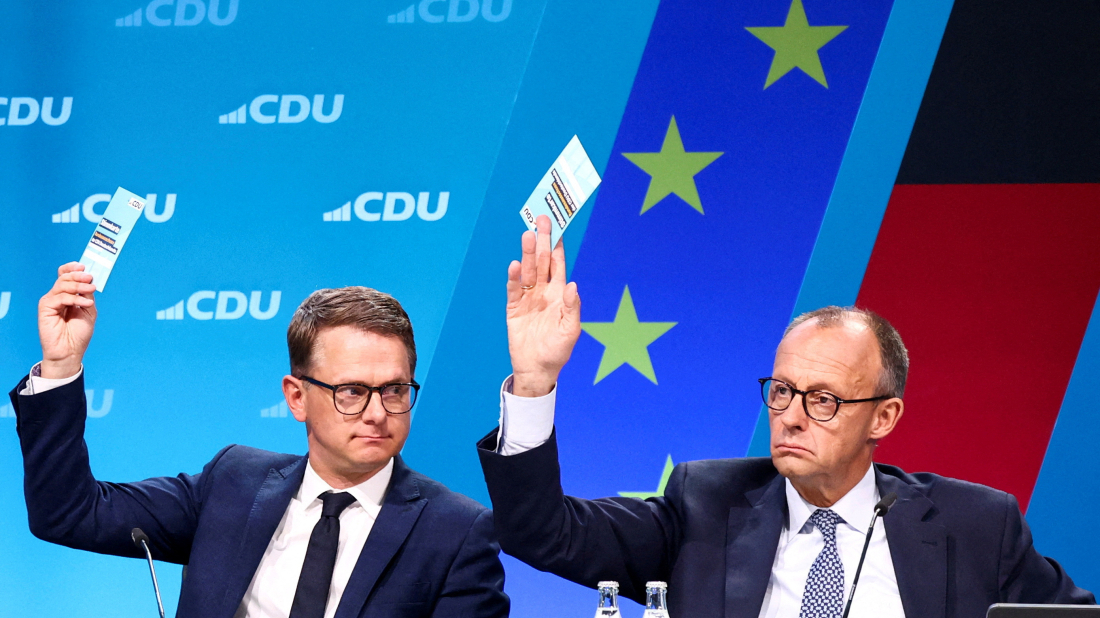Türkiye’s Gaza role depends on U.S.–Israel political consensus
Türkiye has signalled readiness to contribute to a proposed Gaza stabilisation force during the inaugural Board of Peace meeting on Thursday (19 Febr...

Germany's next chancellor, Friedrich Merz, on Monday announced his first major cabinet nominations. He selected energy executive Katherina Reiche as the likely economy minister and close ally Johann Wadephul, a foreign policy expert, as foreign minister.
Merz’s CDU/CSU conservatives, who won the February elections, recently finalized a coalition agreement with the center-left Social Democrats (SPD) as they prepare to tackle international challenges and revive Europe's biggest economy. Their focus includes boosting growth amid a looming recession risk triggered by U.S. President Donald Trump's global trade policies and strengthening Germany’s defense posture within NATO.
Merz aims for his government to be more unified and decisive than the previous SPD-led coalition, which collapsed last November due to internal conflict. Even before officially taking office, Merz and the SPD secured a major fiscal stimulus package to boost spending on infrastructure and defense.
Under the coalition deal, Merz’s CDU will control the economy and foreign ministries, the CSU will lead the interior ministry, and the SPD will oversee defense and finance.
Boris Pistorius is likely to stay on as defense minister, while SPD leader Lars Klingbeil is the favorite for the finance ministry role.
Economic Priorities
The coalition plans to cut taxes for middle- and lower-income groups, reduce corporate taxes, lower energy costs, support the electric vehicle sector, and eliminate a controversial supply chain law. It also promises tougher immigration policies and stronger support for Ukraine against Russian aggression.
Katherina Reiche, the CEO of Westenergie and former head of Germany’s VKU local utilities association, is praised for her deep industry knowledge. She replaces Robert Habeck of the Greens, who faced criticism for lacking economic expertise during his tenure.
Johann Wadephul, a Bundestag member since 2009 and deputy leader of the CDU/CSU parliamentary faction on foreign affairs and defense, will succeed Annalena Baerbock as foreign minister. Analysts believe Wadephul’s close ties to Merz will bring a more consistent and stronger German foreign policy, especially regarding the U.S., China, and Russia.
New Digitalization Ministry
Recognizing the urgent need to modernize Germany’s digital infrastructure, Merz’s coalition has created a new Ministry for Digitalization, to be led by Karsten Wildberger, CEO of Ceconomy AG and former executive at E.ON, Telstra, and Vodafone. This move was hailed by digital industry leaders as a major step forward.
Additionally, Alexander Dobrindt from the CSU will take over the interior ministry, signaling a tougher stance on migration, as the coalition seeks to counter the growing popularity of the far-right AfD.
The SPD will announce its ministers after its members vote to approve the coalition deal, with results expected on Wednesday. Merz is set to be sworn in as chancellor on May 6.
Israel is preparing for the possibility of receiving a green light from the United States to launch strikes against Iran’s ballistic missile system, according to Israel’s public broadcaster KAN.
Aghdam’s Qarabag FK experienced a 6–1 defeat to England’s Newcastle United in the first leg of their UEFA Champions League play-off tie in Azerbaijan's capital Baku Wednesday evening (18 February).
U.S. President Donald Trump’s 'Board of Peace' will hold its first leaders’ meeting on Thursday (19 February) in Washington, D.C., launching an initiative aimed at stabilising Gaza and addressing global conflicts. It's drawn support from regional powers but refusals from several EU countries.
The Board of Peace will be "looking over the United Nations," said U.S. President Donald Trump at the inaugural Washington meeting, where representatives from over 20 countries gathered to unveil plans for Gaza’s reconstruction and coordinate international support.
Russian President Vladimir Putin met Cuban Foreign Minister Bruno Rodriguez in the Kremlin on Wednesday, telling him that new restrictions imposed on the communist-run island were unacceptable.
Russian Foreign Minister Sergey Lavrov reaffirmed Russia’s support on Friday (20 February) for the negotiation process between Washington and Tehran amid escalating regional tensions.
Relations between Russia and Japan have effectively collapsed due to Tokyo’s “unfriendly” stance towards Moscow, the Kremlin said on Friday (20 February), adding that there is currently no dialogue aimed at concluding a peace treaty.
A UN investigation says the Rapid Support Forces assault on al-Fashir, in western Sudan, showed signs of genocide, citing mass killings, coordinated attacks and exterminatory language targeting non-Arab groups.
Hungary will release 250,000 tonnes of crude oil from its strategic reserves following a halt in flows on the Druzhba pipeline. The decision was announced in a government decree published late on Thursday.
Indonesia and the United States have finalised a trade agreement lowering U.S. tariffs on Indonesian goods to 19% from 32%, with exemptions secured for palm oil and several other major exports.
You can download the AnewZ application from Play Store and the App Store.

What is your opinion on this topic?
Leave the first comment